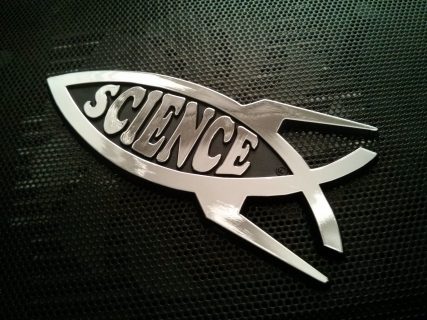
Photo by Steve Rainwater via Flickr Creative Commons https://www.flickr.com/photos/steevithak/13233433785/
Religion shapes all kinds of political views, from opinion on poverty programs to reproductive rights to foreign policy….but space policy, too? New research suggests that religion may shape how people view space exploration
New research in the journal Space Policy suggests that religion shapes views toward space. University of Dayton professor Josh Ambrosius researched the connection between religion and views of space exploration using the 2010 General Social Survey, which had a rich set of questions on space and detailed items on religion.
Even after taking into account lots of other factors, Ambrosius uncovers several important findings
- Evangelicals aren’t as into space exploration as everyone else. Compared to other Americans, they know less about space; they care less about space exploration; and they’re less supportive of space policy.
- People who go to church more often are less supportive of space exploration. However, if they happen to go to a church with a pastor who speaks in favor of science, then they are more likely to be supportive. This clergy influence is strongest among evangelicals.
- Jews, Hindus, Buddhists, and those with no religion were some of the most interested advocates for space exploration.
But one of the most interesting findings was the relationship between beliefs about evolution and views of space. Even after taking into account a bunch of other religious factors, people who don’t believe that evolution is true are
- less knowledgeable about space and science,
- less supportive of space policy,
- less interested in space, and
- less likely to see science as beneficial for society.
This link between views of creation/evolution and space exploration came out in the debate between Creation Museum founder Ken Ham and science education Bill Nye, who is also CEO of the Planetary Society. In July, Ham wrote a blog post for Answers in Genesis that poo-pooed the idea of finding life anywhere but on earth.
I’m shocked at the countless hundreds of millions of dollars that have been spent over the years in the desperate and fruitless search for extraterrestrial life. Even Bill Nye “the Science Guy,” in our recent debate, happily gloated about tax dollars being spent toward this effort. And now, secular scientists are at it again.
Of course, secularists are desperate to find life in outer space, as they believe that would provide evidence that life can evolve in different locations and given the supposed right conditions! The search for extraterrestrial life is really driven by man’s rebellion against God in a desperate attempt to supposedly prove evolution!
Because of some less-than-clear arguments in Ham’s post, some media outlets reported that Ham also said that 1) NASA should be defunded and 2) aliens, if found, would go to Hell. Ham responded to these claims. In a YouTube video, Ham encouraged NASA to continue exploration because he sees their inability to find life as proof that evolution is a false theory.
Catholics were the strongest believers in life elsewhere in the universe. If life is found through space exploration, then it will be interesting to see how Ham and other creationists respond to the news. As for Catholics, Pope Francis has already hinted that the Church should be open to anyone, including green Martians with long noses and big ears.
And, yes, Ken Ham: we know the Pope and the Catholic Church also believe in evolution.
Does religion impede space exploration? Taking into account all of the evidence, Ambrosius concludes,
No, religion does not stand in the way of serious space exploration—but the space community still has a lot of work ahead to reach skeptical Evangelicals, foster support among religious friends of space, and convince young people that our future is among the stars.
Note: The post is adapted from an a previous post published after this research was presented at the 2014 meeting of the Society for the Scientific Study of Religion.
Don’t miss any more posts from the Corner of Church & State. Click the red subscribe button in the right hand column. Follow @TobinGrant on Twitter and on the Corner of Church & State Facebook page.





